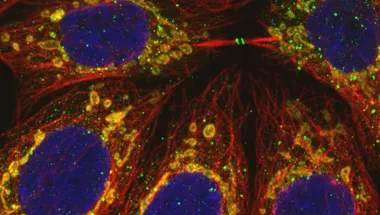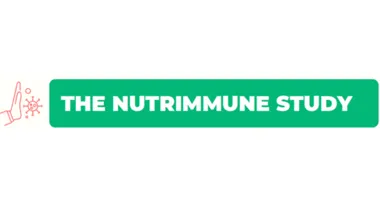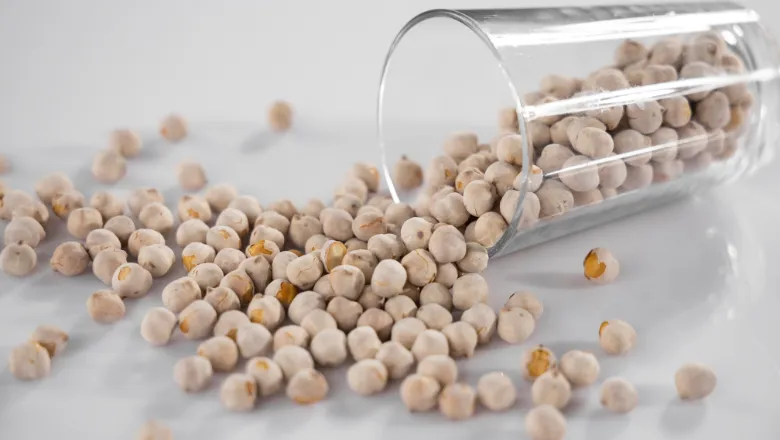
Professor Sarah Berry
Professor
Research interests
- Cardiovascular
- Nutrition
Biography
Professor Sarah Berry’s research interests relate to the influence of dietary components on markers of cardiovascular disease risk, with a particular focus on:
- Precision nutrition
- Postprandial metabolism
- Food and fat structure
Since commencing her research career at King’s in 2000, she has been the academic leader for more than 35 human nutrition studies in cardio-metabolic health. Sarah has made a leading contribution to the knowledge-base on the influence of interesterification of triacylglycerols on postprandial metabolism. Her research also focuses on the influence of manipulation of food structure and subsequent effects on lipid and carbohydrate bioaccessibility and changes in postprandial metabolism.
Ongoing research involves human and mechanistic studies to elucidate how markers of cardiometabolic health can be modulated following acute and chronic intakes of different fatty acids and interesterified fats, as well as studies to investigate the influence of cell wall integrity on macronutrient and micronutrient release from different plant-based foods.
Sarah is also the lead nutritional scientist on the PREDICT programme, assessing the genetic, metabolic, metagenomic, and meal-dependent effects on metabolic responses to food in >20,000 individuals in the UK and US. This research is at the forefront of developments in personalised nutrition and is forging a new way forward in the design and implementation of large-scale remote nutrition research studies integrating novel technologies, citizen science and AI.
Research

DIMENSION
DIMENSION investigates the causal impacts of dietary intake on epigenetic regulation of gene function, and their impact on subsequent cardio-metabolic health outcomes.

Lipids and Membranes Research Interest Group
A Lipids and Membranes Research Interest Group

Personalised nutrition
Personalised nutrition, also known as precision nutrition, is a dietary strategy that takes into account an individual's genetic and phenotypic characteristics, lifestyle, and environmental factors to provide tailored dietary recommendations.

Postprandial metabolism
Postprandial metabolism refers to the metabolic changes that occur after a meal, following the absorption and processing of nutrients

Cardiometabolic health and diet
The Cardiometabolic health and diet Research Group is led by Dr Wendy Hall.

Chrononutrition
Chrononutrition is the study of interactions between diet, circadian rhythms, and sleep, and their impact on health. Misalignment between circadian rhythms and the timing of eating may have adverse effects on metabolic function and increase risk of weight gain.

Fats and fatty acids
Understanding of the role of dietary fats and fatty acids in human health is constantly evolving. Our department has a longstanding interest in the effects of manipulating dietary fat composition on cardiometabolic disease risk factors

The NutrImmune Study
Investigating how diet can optimise our immune response to flu vaccines. We're recruiting healthy adults, aged 40-64 years old, who consume 2+ snacks per day.
Project status: Ongoing

Safe and sustainable diets for a healthy body and mind (SSuDs)
This Research Interest Group on Safe and Sustainable Diets for a Healthy Body And Mind provides a unique opportunity for the King’s research community to address the challenges of safe and sustainable diets across a range of health outcomes
News
Christmas without the guilt – 12 health-boosting festive foods
Christmas is known as a time of indulgence and overeating, but some festive foods might actually be beneficial to our health.

Personalised nutrition more effective than general diet advice
Personalised nutrition approaches can improve several key health metrics including lower weight, lower cholesterol, better mood, improved gut health, lower...

Two teams awarded Cancer Grand Challenges £20m funding
Two teams from King’s have been awarded funding to take on some of cancer’s toughest challenges.

14-hour fasting improves hunger, mood and sleep
Eating in a ten-hour window is associated with higher energy and mood and lower hunger levels, new results from the largest UK community science study of its...

A quarter of people are undoing the benefits of healthy meals by unhealthy snacking
A quarter of people are undoing the benefits of healthy meals with unhealthy snacks, which increases the risk of strokes and cardiovascular disease.

Three researchers shortlisted for Cancer Grand Challenges funding
Professor Tim Spector, Dr Sarah Berry and Dr Sheeba Irshad of King’s have been selected for the final stages of Cancer Grand Challenges as part of teams...

Irregular sleep patterns associated with harmful gut bacteria
New research has found irregular sleep patterns are associated with harmful bacteria in your gut.

BBC One: King's academics highlight impact of ultra-processed food on health
Professor Tim Spector and Dr Sarah Berry from the Faculty of Life Sciences & Medicine have stressed how ultra-processed food can impact on long-term health in...

Bread made from cell pulse flour keeps you fuller for longer
Bread made from a new type of whole cell pulse flour can lower blood glucose (sugar) levels and keep you fuller for longer, new research has found.

Adjusting diet can help women through menopause
Altering diet can reduce unfavourable health changes associated with menopause such as blood sugar control and cholesterol levels.

Events

Inaugural Lectures: Professors Jordana Bell & Sarah Berry
Inspiring talks from two of our new professors about their work, their specialisations, and their journeys to where they are today.
Please note: this event has passed.
Features
Spotlight on nutrition: Research into the impacts of our diets
From beans, to berries to new types of bread, our researchers have been doing a range of work to help us better understand how you are what you eat.

Six ingredients to make a nutritious Christmas meal
We've pulled together the perfect recipe for a hearty and healthy Christmas meal to get you through the holiday season

Research

DIMENSION
DIMENSION investigates the causal impacts of dietary intake on epigenetic regulation of gene function, and their impact on subsequent cardio-metabolic health outcomes.

Lipids and Membranes Research Interest Group
A Lipids and Membranes Research Interest Group

Personalised nutrition
Personalised nutrition, also known as precision nutrition, is a dietary strategy that takes into account an individual's genetic and phenotypic characteristics, lifestyle, and environmental factors to provide tailored dietary recommendations.

Postprandial metabolism
Postprandial metabolism refers to the metabolic changes that occur after a meal, following the absorption and processing of nutrients

Cardiometabolic health and diet
The Cardiometabolic health and diet Research Group is led by Dr Wendy Hall.

Chrononutrition
Chrononutrition is the study of interactions between diet, circadian rhythms, and sleep, and their impact on health. Misalignment between circadian rhythms and the timing of eating may have adverse effects on metabolic function and increase risk of weight gain.

Fats and fatty acids
Understanding of the role of dietary fats and fatty acids in human health is constantly evolving. Our department has a longstanding interest in the effects of manipulating dietary fat composition on cardiometabolic disease risk factors

The NutrImmune Study
Investigating how diet can optimise our immune response to flu vaccines. We're recruiting healthy adults, aged 40-64 years old, who consume 2+ snacks per day.
Project status: Ongoing

Safe and sustainable diets for a healthy body and mind (SSuDs)
This Research Interest Group on Safe and Sustainable Diets for a Healthy Body And Mind provides a unique opportunity for the King’s research community to address the challenges of safe and sustainable diets across a range of health outcomes
News
Christmas without the guilt – 12 health-boosting festive foods
Christmas is known as a time of indulgence and overeating, but some festive foods might actually be beneficial to our health.

Personalised nutrition more effective than general diet advice
Personalised nutrition approaches can improve several key health metrics including lower weight, lower cholesterol, better mood, improved gut health, lower...

Two teams awarded Cancer Grand Challenges £20m funding
Two teams from King’s have been awarded funding to take on some of cancer’s toughest challenges.

14-hour fasting improves hunger, mood and sleep
Eating in a ten-hour window is associated with higher energy and mood and lower hunger levels, new results from the largest UK community science study of its...

A quarter of people are undoing the benefits of healthy meals by unhealthy snacking
A quarter of people are undoing the benefits of healthy meals with unhealthy snacks, which increases the risk of strokes and cardiovascular disease.

Three researchers shortlisted for Cancer Grand Challenges funding
Professor Tim Spector, Dr Sarah Berry and Dr Sheeba Irshad of King’s have been selected for the final stages of Cancer Grand Challenges as part of teams...

Irregular sleep patterns associated with harmful gut bacteria
New research has found irregular sleep patterns are associated with harmful bacteria in your gut.

BBC One: King's academics highlight impact of ultra-processed food on health
Professor Tim Spector and Dr Sarah Berry from the Faculty of Life Sciences & Medicine have stressed how ultra-processed food can impact on long-term health in...

Bread made from cell pulse flour keeps you fuller for longer
Bread made from a new type of whole cell pulse flour can lower blood glucose (sugar) levels and keep you fuller for longer, new research has found.

Adjusting diet can help women through menopause
Altering diet can reduce unfavourable health changes associated with menopause such as blood sugar control and cholesterol levels.

Events

Inaugural Lectures: Professors Jordana Bell & Sarah Berry
Inspiring talks from two of our new professors about their work, their specialisations, and their journeys to where they are today.
Please note: this event has passed.
Features
Spotlight on nutrition: Research into the impacts of our diets
From beans, to berries to new types of bread, our researchers have been doing a range of work to help us better understand how you are what you eat.

Six ingredients to make a nutritious Christmas meal
We've pulled together the perfect recipe for a hearty and healthy Christmas meal to get you through the holiday season

